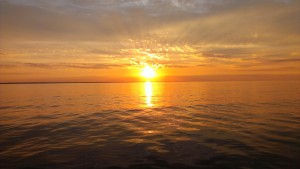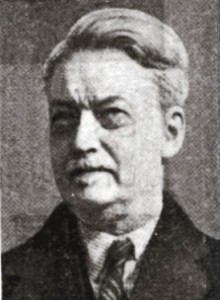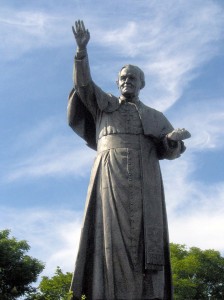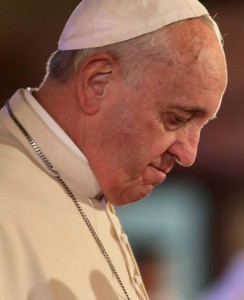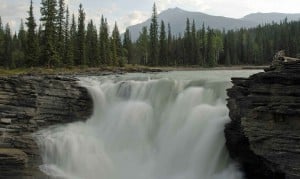“By the word of the Lord the heavens were made” (Ps 33:6). This tells us that the world came about as the result of a decision, not from chaos or chance, and this exalts it all the more. The creating word expresses a free choice. The universe did not emerge as the result of arbitrary omnipotence, a show of force or a desire for self-assertion. Creation is of the order of love. God’s love is the fundamental moving force in all created things: “For you love all things that exist, and detest none of the things that you have made; for you would not have made anything if you had hated it” (Wis 11:24). Every creature is thus the object of the Father’s tenderness, who gives it its place in the world. (Laudato Si’, 77)
Half the world – Jews, Christians, and Muslims – imagine the metaphysical narrative of the world in this way: This universe was brought forth in time by a Creator Who is separate from the world and far greater than the world. Four implications can be derived from that vision. All meet the tests of sound common sense.
(1) Nature is not God, and is not divine. Nature ought not to be worshiped, nor idealized, nor regarded as a sacred icon.
(2) Nature is meant for man, not man for nature. It is humans, male and female, and not brute nature, that are made by their unique endowment of liberty to be provident over their own destiny; they are made in the image of God. Thus we worry about the environment for the sake of humans. Indeed, humans are by no means necessary for the survival of this planet. If humans disappeared during the next thousand years, the planet might well go on spinning through silent space for millions of years, in a lively and ever-changing fashion, species appearing and species disappearing. The earth would then become again, as it were, unconscious, that is, without conscious life upon it, trod upon only by brute creatures that can neither talk nor think nor laugh nor argue nor debate. A silent and unthinking planet, like all the others so far encountered. And like them, enduring for ages and ages and ages.
(3) Since prehistoric times, nature has come at humans, as the Poet says, “red in tooth and claw.” Nature has been man’s hostile foe as well as friendly home. From the beginning, nature’s elements warred against our primitive human ancestors. Wild beasts and predatory birds devoured some of them. Humans have been pummeled by storms, floods, avalanches, earthquakes, falling comets, hurricanes, and typhoons. Snows and ices, showing no mercy, took away life from hundreds of thousands. Bacteria, viruses, and all manner of diseases and plagues preyed upon them, keeping the total human population low and at an average life span of under twenty years. For thousands of centuries, the life of humans on earth was threatened by total extinction.
(4) The capacity of nature to be hospitable to human life is, therefore, given over only in part to the responsibility of humans; nature follows its own laws, which were in operation before humans came to be, and may well endure long after humankind has vanished from this earth. Nonetheless, humans must take care regarding their own impact upon nature. They must be provident over their own welfare and that of their children for ages to come.
In order to keep nature hospitable to human life, humans must take care not to foul their own habitat. Only in very recent times, since about the year 1800, has the human race begun acquiring sufficient knowledge to hold at bay the diseases that choked off its mortality. Only then could their numbers jump from almost 750 million in 1776 to 6 billion in the year 2000. During this same brief time span, human science and ingenuity and enterprise have shown historically unprecedented capacities for industrial production. At first, this industry spewed smoke, ash, and gases into the circumambient air and water. Only within the last two generations (when electronics replaced mechanics as the main organizing principle of machines) have greater knowledge and new inventions allowed industry to become increasingly clean and more compatible with nature.
The sciences of sanitation, hygiene, and medical care advanced within a single century by such leaps that the worldwide average age of human mortality suddenly shot up from about 30 in 1870 (as it had been throughout most of human history) to 67 in 2001. Indeed, Pope Francis himself writes: “Technology has remedied countless evils which used to harm and limit human beings. How can we not feel gratitude and appreciation for this progress, especially in the fields of medicine, engineering and communications? How could we not acknowledge the work of many scientists and engineers who have provided alternatives to make development sustainable?” (LS, 102)
Even so, Francis quotes St. John Paul II as he reminds us of our duty to care for the earth:
The destruction of the human environment is extremely serious, not only because God has entrusted the world to us men and women, but because human life is itself a gift which must be defended from various forms of debasement. Every effort to protect and improve our world entails profound changes in ‘lifestyles, models of production and consumption, and the established structures of power which today govern societies’. Authentic human development has a moral character. It presumes full respect for the human person, but it must also be concerned for the world around us and ‘take into account the nature of each being and of its mutual connection in an ordered system’. Accordingly, our human ability to transform reality must proceed in line with God’s original gift of all that is (LS, 5).

